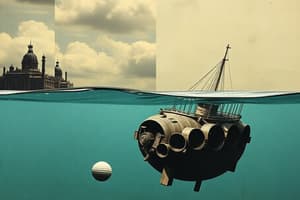Podcast
Questions and Answers
What is buoyancy also known as?
What is buoyancy also known as?
- Upthrust (correct)
- Lateral pressure
- Downforce
- Vertical tension
What happens to the pressure at the bottom of an object submerged in a fluid compared to the top of the object?
What happens to the pressure at the bottom of an object submerged in a fluid compared to the top of the object?
- It remains the same
- It is lesser
- It fluctuates
- It is greater (correct)
What is the magnitude of the buoyant force proportional to?
What is the magnitude of the buoyant force proportional to?
- Fluid's density
- Object's weight
- Object's volume
- Pressure difference (correct)
Under what condition can the buoyant force keep an object afloat?
Under what condition can the buoyant force keep an object afloat?
What happens to an object with average density greater than the fluid in which it is submerged?
What happens to an object with average density greater than the fluid in which it is submerged?
What does the word 'Eureka' mean in Ancient Greek?
What does the word 'Eureka' mean in Ancient Greek?
What does the term 'heuristic' refer to?
What does the term 'heuristic' refer to?
In the Greek pronunciation, where does the accent fall in the word 'Eureka'?
In the Greek pronunciation, where does the accent fall in the word 'Eureka'?
Where is the accent of the English word 'Eureka' placed?
Where is the accent of the English word 'Eureka' placed?
What does the word 'heurískō' mean in Ancient Greek?
What does the word 'heurískō' mean in Ancient Greek?
Flashcards are hidden until you start studying
Study Notes
Buoyancy and Fluid Pressure
- Buoyancy is also known as upthrust.
- When an object is submerged in a fluid, the pressure at the bottom of the object is greater than the pressure at the top.
- The magnitude of the buoyant force is proportional to the volume of the fluid displaced by the object.
- The buoyant force can keep an object afloat when the weight of the object is equal to the weight of the fluid displaced.
Objects in Fluids
- If an object has an average density greater than the fluid in which it is submerged, it will sink.
Ancient Greek Terms
- The word 'Eureka' means "I have found it" in Ancient Greek.
- The term 'heuristic' refers to a method of discovery or a guiding principle.
- In the Greek pronunciation, the accent falls on the first syllable (EU-reka).
- In the English word 'Eureka', the accent is placed on the second syllable (E-uREKA).
- The word 'heurískō' means "I find" in Ancient Greek.
Studying That Suits You
Use AI to generate personalized quizzes and flashcards to suit your learning preferences.




